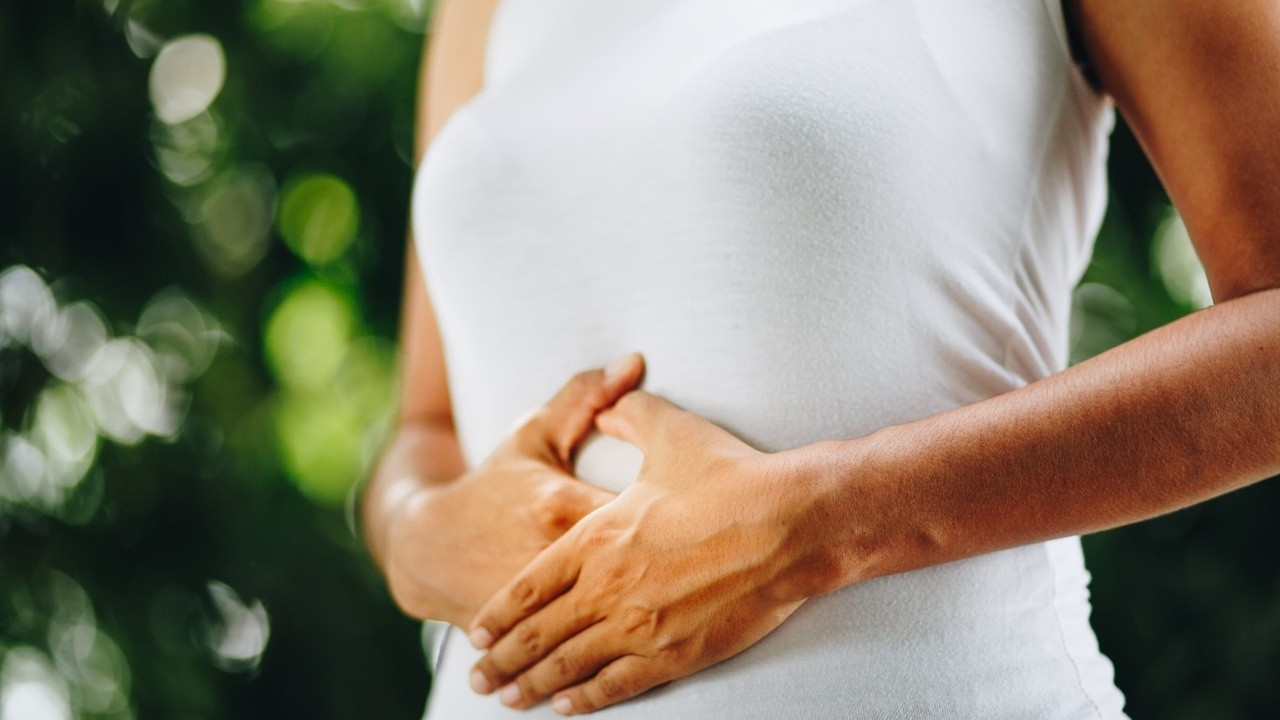3 Solutions You Need to Know About to Beat Menopause Bloating for Good


With the start of the new year, it is a perfect time to address the top complaint I hear from perimenopausal and menopausal women: menopause bloating (and/or excess girth around the middle). Is this you? The age range that women typically experience menopause is between 40 and 58. While menopause is usually defined as a woman having missed her period for 12 consecutive months, the changes and hormonal fluctuations leading up to menopause are called perimenopause and can last for four to eight years.
During this time, the risk of heart disease, stroke, diabetes, and osteoporosis increases as hormones begin to fluctuate and decline. Not only that, according to The XX Brain, by Lisa Mosconi, PhD, decline of estrogen (also known as the ‘master regulator’ of the female brain) causes women to become more vulnerable to Alzheimer’s disease. Having said that, you might think the most common question I receive as a menopause coach would be about how to avoid these deadly disease risks. But it’s not. Everyone wants to know how to lose weight and fight menopause bloating.
Why are so many perimenopausal women still struggling with weight, even though they know it can lead to serious health implications, and even death? Clearly, this is a case where self-knowledge is NOT a tool. Because if just knowing about the link between non-nutritious food consumption, excess weight and disease risk were enough to empower us to choose healthier foods and portion sizes every day, we would all be making those choices. And in so doing, we would all have minimized our disease risk, and would all have achieved and sustained the weight loss that comes with making nutritional, non-inflammatory food choices. And none of us would have excess girth or feel like we have menopause bloating going on. Yet why is this not the case?
If knowing that, for example, consuming a plant-rich, Mediterranean-type, moderate plan of eating is the optimal choice for health and longevity, why do women continually combine extreme, food-group-eliminating diets with extreme exercise, neither of which honors the physiological needs of the 40 to 50+ year old woman? Unrealistic diets not only do not achieve and sustain weight loss, but they also perpetuate the negative shame-spiral mindset that many women have lived with for decades. To repeat this spiral ad infinitum, and expect a different result, is the definition of insanity. Yet many continue on this path, hoping that this time will be different.
One reason for this insanity is that after dieting for so many years, if they weren’t dieting, they would have no clue what balanced eating even looks like. Hence, they continue jumping from an extremely restrictive diet (lasting from days to weeks), to a bout of unbridled eating (lasting from days to months to years), to the next extreme diet, continually miserable, disliking their body, and with an ever-increasing waistline and disease risk.
What if I told you, diets, restriction, and extreme exercise are actually focusing on entirely the wrong area? I discovered this more than 35 years ago and have not dieted or participated in forms of extreme exercise since. Even through pregnancy and beyond.
The secret to achieving and maintaining your aging alchemy goals physically, intellectually, emotionally, and spiritually, is to get on the write path. I call this focusing ‘between the ears.’ Once I stopped dieting and focused between the ears, I became emotionally literate. I began to choose inflammation-causing foods less often, and my portion sizes evolved into amounts that didn’t leave me feeling overfull, uncomfortable, or experiencing menopause bloating. I no longer needed to engage in exercise bulimia (extreme, excessive exercise to compensate for bouts of eating with wild abandon). The balance came slowly. Organically. Over time, and without dieting, my body became four clothing sizes smaller.
Did I mention without dieting? Was it magic? No. It took time. There is no quick fix. I’ve sustained this realistic lifestyle for more than 35 years, even during perimenopause, menopause, and beyond, and have helped countless women do the same.
Here are the 3 solutions you need to know about to beat menopause bloating for good:
1. Prioritize Mental Health and Self-Compassion
Check in with your mental health. Athlete Simone Biles was an excellent example of this at the recent Olympic games when she seemingly took a personal wellness inventory on the spot and honored her mental health without regard for how she might be perceived in the public eye. Take time daily to successfully manage chronic stress through mindfulness and self-compassion. Reduced chronic stress leads to more self-loving food choices and portion sizes. And vice versa. Mindfulness can be as simple as sitting still for one minute, closing your eyes, and taking three deep breaths.
Kristin Neff, PhD is a pioneering researcher in the area of self-compassion. Along with Christopher Germer, PhD, they have developed a system called “Mindful Self-Compassion” which provides a powerful means of developing emotional resilience.
2. Redirect Your Self-Talk
Psychologist and Consciousness expert Ethan Kross, PhD points out in his book, “Chatter: The Voice in Our Head, Why it Matters, and How to Harness It, that there are science-based tools available to help people bring their thoughts, feelings, or behaviors back into alignment with their goals. I’ll show you next how I use one of these tools.
3. Get on the Write Path
In the 1980s, expressive writing pioneer James Pennebaker researched the correlation between expressive writing and physical health. His initial studies and the subsequent hundreds that followed revealed many health benefits, including reduced anxiety, blood pressure and depression, as well as improved memory, sleep quality, and job performance.
While expressive writing is not for everyone, you might consider it if you feel you spend too much time thinking about your weight, your body, and dieting. There are numerous ways to write and derive health benefits; try different ones to determine the ones that work best for you.
To learn more specifically about how you can use expressive writing to become emotionally literate and improve menopause body-confidence and overall health, check out my free resources at www.sallybartlett.com.



